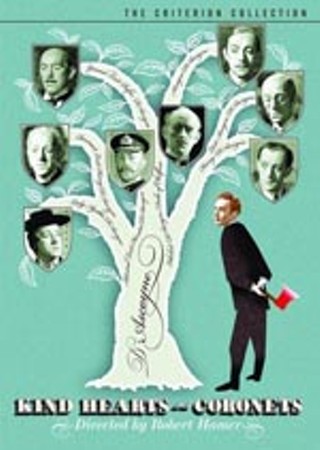Kind Hearts and Coronets
If comedy is a dish best served black, Kind Hearts and Coronets is beluga caviar marinated in its own ink.
Reviewed by Raoul Hernandez, Fri., Feb. 24, 2006

Kind Hearts and Coronets
Criterion, $29.95
If comedy is a dish best served black, Kind Hearts and Coronets is beluga caviar marinated in its own ink. And cold; bloody well frozen. Founded at the turn of last century and resurrected at the dawn of this one, London's Ealing Studios shot from propaganda to Technicolor in its prime, 1938-1955, but remains eternally exalted for peerless UK ticklers The Man in the White Suit, The Lavender Hill Mob, and The Ladykillers. Like its crowning achievement, Robert Hamer's note-perfect horn blast of immortality, all of them weep with laughter and humble gratitude for Alec Guinness' divine grace. In one of two supplements on a second disc, a 75-minute BBC documentary on Ealing, all principals bow to Hamer's literate exactitude, while at the same time parroting cliches "chameleon," "reclusive," and "shy" about the writer/director's star, Guinness. "Reserved much more than shy," smiles Sir Alec himself (1914-2000) in Kind Hearts and Coronets' other bonus, an hourlong one-on-one with the actor on BBC in 1977, just off his turn (and 21Ú4%) in Star Wars. Revelations of his "lonely" childhood and that his best characterizations were gleaned from routine trips to the London Zoo, not to mention Guinness and Noel Coward's advice to young actors ("Learn the lines and don't bump into any furniture"), are almost as delicious as the film itself. Almost, that is, if 1949's Coronets were a four-star meal instead of five. Impeccable, from the hangman's opening query on how to address the morrow's appointment ("His Lordship?") to all eight D'Ascoynes the potential 10th duke of Chalfont must murder to avenge the familial abandonment and pauper's grave of his sainted mum. The screenplay – most of it in voiceover – might rival Tennyson, from whose poetry the film takes it name, if every blessed line weren't as lashing as some sort of mad approximation of Jane Austen and Edgar Allan Poe. Revenge is glacial in the hands of Louis (Dennis Price), whose black heart and haughty stare comes up against the feminine eyes and pursed lips of Guinness romping through all manner of D'Ascoyne, young and old, and particularly Lady Agatha D'Ascoyne and her flowing blond tresses. In a TV segment on another Criterion classic, 1960 Ronald Neame flourish Tunes of Glory, Guinness' Kind Hearts and Coronets comes through loud and clear when he reveals that he was originally only offered the parts of four D'Ascoynes. "I read [the screenplay] on a beach in France, collapsed with laughter on the first page, and didn't even bother to get to the end of the script," he recounts. "I went straight back to the hotel and sent a telegram saying, 'Why four parts? Why not eight!?'"









